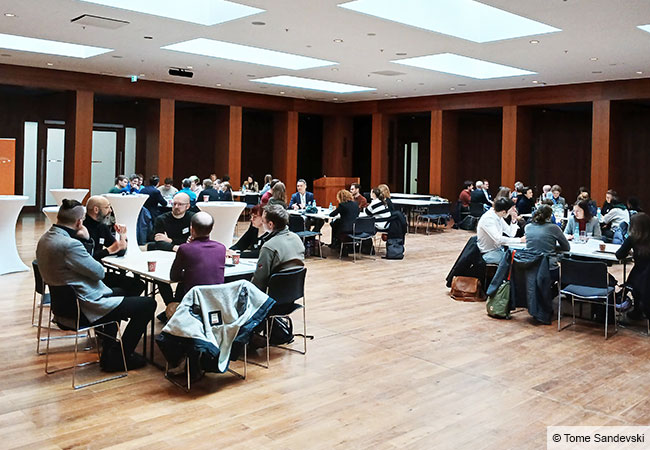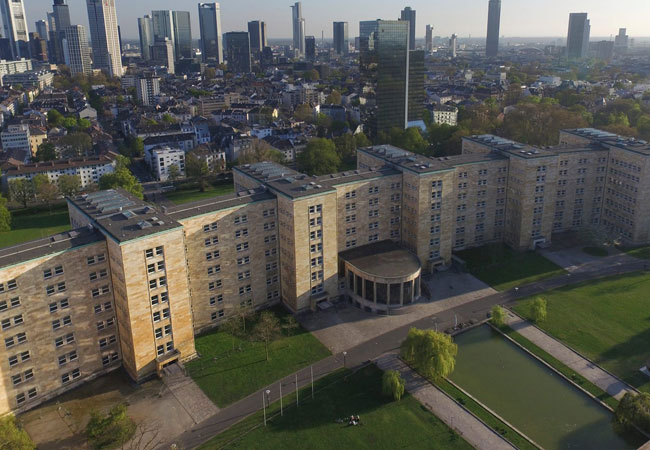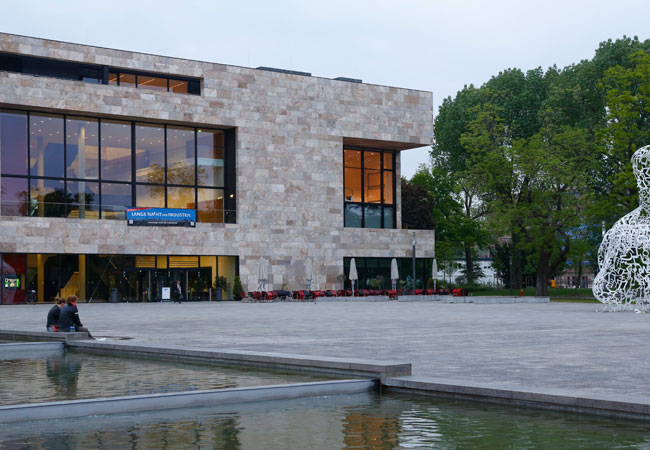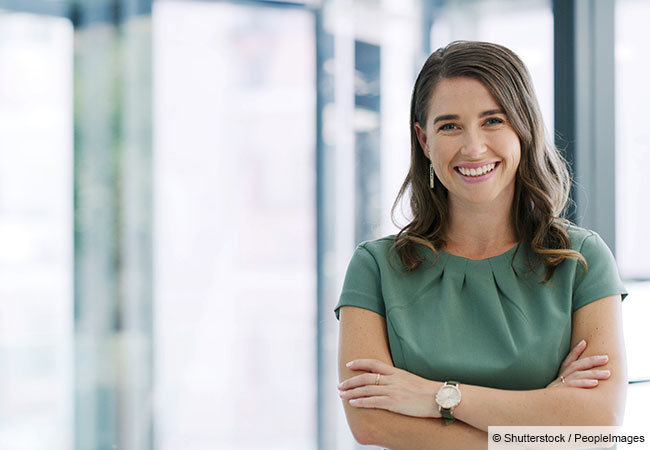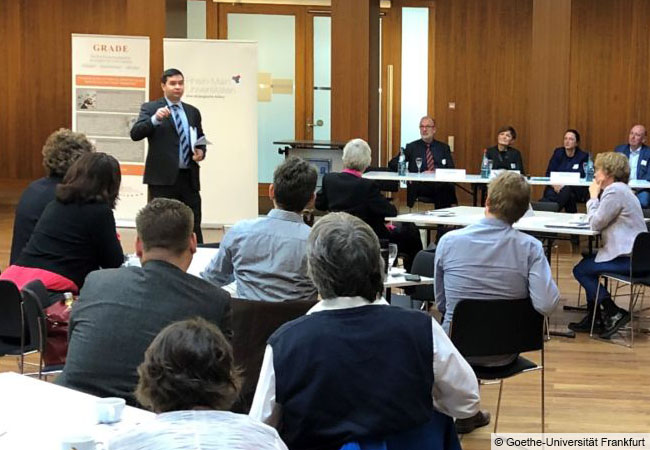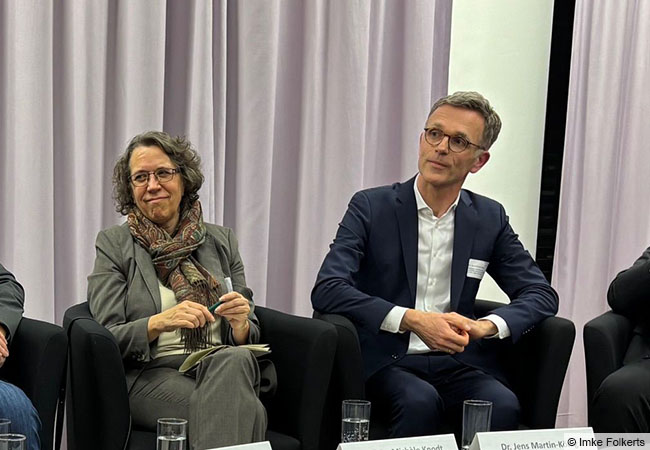New results from the nationwide Nacaps survey of doctoral candidates
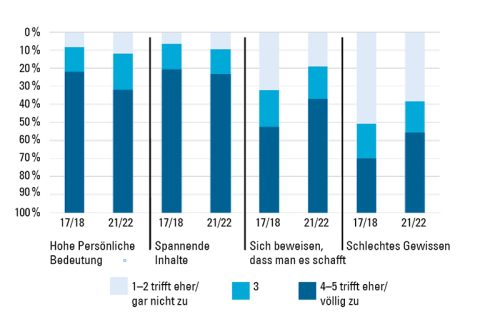
Goethe University Frankfurt, 2017/18 and 2021/22 surveys
Since 2017, the German Center for Higher Education Research and Science Studies (DZHW) has conducted the National Academics Panel Study (Nacaps) to collect data on the research, working and living conditions as well as the career paths of doctoral candidates. The Goethe Research Academy for Early Career Researchers (GRADE), which coordinates Goethe University Frankfurt’s participation in the study, has now evaluated the university-specific survey results of the third cohort, whereby only respondents who are currently actively working on their doctorate and have not yet completed it were taken into account. This analysis for the first time enables a time-series comparison between respondents of the 2017/2018, 2019/2020 and 2021/2022 surveys – with some surprising insights.
The demographic data of the doctoral candidates at Goethe University Frankfurt who participated in the survey have hardly changed since 2017, which increases the data’s comparability over time. Gender distribution remains stable, with slightly more female doctoral candidates than male. In addition, doctoral candidates at Goethe University Frankfurt are slightly older than the national average and more likely to have children. The proportion of candidates who have at least one parent with a doctoral degree is also marginally higher at Goethe University Frankfurt.
When it comes to sources of funding, the differences between Goethe University Frankfurt and other universities are greater. Around 60 percent of the university’s doctoral candidates primarily finance their doctorate either by working as research associates or by means of a scholarship, a figure that is significantly below the national average of 75 percent. This deviation can be only partly explained by the subject structure at Goethe University Frankfurt (a large number of doctorates in medicine, the humanities and the social sciences). In addition, in the last cohort to be interviewed, more doctoral candidates at Goethe University Frankfurt worked part-time, with employment on a scale of between 25 and 65 percent the full-time equivalent found more frequently than in the national comparison. This might be a reason why, at €1,200, the average monthly means of subsistence of doctoral candidates in Frankfurt is also below the national average of around €1,400.
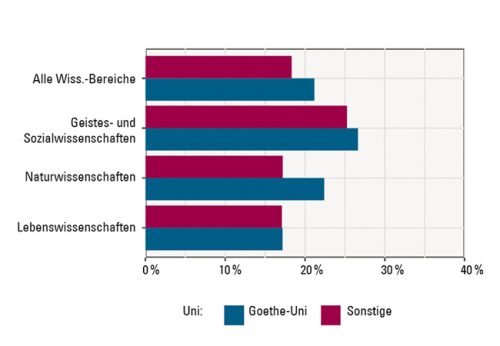
Goethe University Frankfurt and other universities by academic field
Notwithstanding the somewhat more difficult financial situation, 65 percent of doctoral candidates at Goethe University Frankfurt are satisfied or very satisfied with the support they receive from their first supervisor, while around 14 percent are less satisfied or not at all satisfied. This score is slightly lower than in 2021 and marginally below the national average, which has hardly changed compared to the previous survey (68 percent satisfied, 13 percent dissatisfied). Despite these minor deviations, the overall high level of satisfaction with supervision at Goethe University Frankfurt is probably a reason why doctoral candidates’ motivation to continue with their doctorates remains high.
In the last cohort interviewed, the proportion of candidates who constantly or often think about discontinuing their doctoral studies is around 10 percent, as it was four years ago. Of the respondents, 66 percent rarely or never think about discontinuing their doctoral studies, slightly less than in previous surveys. The peak was 72 percent in 2021. The predominant motives for undertaking a doctorate remain “personal interest” and the “interesting content of the doctorate”. However, there appears to be an increase in intrinsic pressure due to psychological factors. Both at Goethe University Frankfurt and nationwide, the figures for the motives “bad conscience if I didn’t do it” or the feeling of “having to prove it to myself” have risen (see Fig. 1). Thoughts of dropping out occur less frequently if the supervision relationship is perceived as positive, the supervisors’ behavior is considered inspiring and supportive, the motivation to do research is strong, and the level of satisfaction with work-life balance is high.
This is also shown by the data on general life satisfaction. Between the 2017/18 and 2021/22 cohorts, the average score (measured on a scale of 0 to 10) awarded by Goethe University doctoral candidates fell slightly, from 7.2 to 6.9 (the same results as nationwide). A downturn is also apparent when it comes to doctoral candidates’ level of satisfaction with work-life balance: The average score fell from 6.2 to 6.0 – and once again reflects the nationwide comparison. Interestingly, at 6.6, the level of satisfaction with work-life balance was highest among all doctoral candidates (Goethe University Frankfurt and nationwide) during the second survey, conducted in early 2021 at the height of the coronavirus pandemic. The same is true when looking only at the group of respondents with children. It could be that the widespread introduction of working from home had at least a partially positive effect on doctoral candidates’ living conditions.
With regard to conflicts, bullying and sexualized violence, for which data are systematically collected, the results show that 21 percent of respondents from all universities experienced serious conflicts during their doctorate. In addition, 8 percent have witnessed sexual harassment and 30 percent bullying. It is noticeable that female doctoral candidates have both experienced conflicts themselves more frequently and witnessed bullying and sexual harassment significantly more frequently than male doctoral candidates.
With regard to general health, a slight downturn can be observed among doctoral candidates at Goethe University and nationwide across the cohorts, even if around three quarters of all respondents still rate their general health as “(very) good”. This trend is also evident in their subjective perception of their mental health: Doctoral candidates from all universities in the 2017/18 cohort experienced an average of 5.8 days within the four weeks prior to the survey on which their mental health was compromised, while the 2022/23 respondents reported an average of 6.5 days. This could reflect the impact of ongoing social crises. On the one hand, the coronavirus pandemic exerted great pressure on doctoral candidates to change their working and living conditions, the full effect of which is only becoming visible with a certain time lag. On the other hand, the current survey was conducted at the beginning of 2023 and thus at the height of inflation and the energy crisis.
Between 2021 and 2023, the proportion of doctoral candidates at Goethe University Frankfurt who would like to continue their career in academia fell from 25 percent to 21 percent (nationwide from 21 percent to 18 percent), whereby there are considerable differences between academic fields (see Fig. 2), which are even more pronounced at the individual subject level. In the last survey, between 30 and 40 percent of doctoral candidates in most humanities and social science subjects aspired to an academic career, compared to around 10 percent in computer science and law.
On a scale of 1 (positive) to 5, doctoral candidates at Goethe University Frankfurt rate their chances of securing a postdoctoral position at 3.1, which corresponds both to the national average and the results of the last surveys. In comparison, at 2.5, the doctoral candidates rate their prospects of finding a position outside academia that is commensurate to their qualifications significantly better. This figure has improved in comparison to previous surveys and is also better than the national average. It might reflect the situation in the labor market, which was still very positive at the beginning of 2023, but also the efforts made by Goethe University Frankfurt to prepare doctoral candidates equally well for various career paths.
In this context, the numerous support measures offered by GRADE, which the doctoral candidates were also asked about, should also be mentioned. Almost two thirds of respondents stated that they were familiar with GRADE’s offers, with the latest survey confirming the academy’s very positive perception in the previous surveys. Among the interviewees who have used GRADE’s services, around 83 percent are satisfied or very satisfied, only 2 percent are less satisfied or not at all satisfied. The average score for GRADE services on a scale of 1 to 5 (positive) improved once again from 4.2 to 4.3 – and serves as a motivation for GRADE to continue its work and make its services better known, especially help with mental health issues and advice on career paths both in and outside academia.
All told, the current comparison with nationwide data shows that support services are very important, and that it is necessary to continuously improve the general conditions for doctoral candidates at Goethe University Frankfurt. That is why GRADE sets out to continue being an effective first port of call for individual assistance and further training for early career researchers and support doctoral candidates as efficiently as possible in their personal development.
Author: Moritz Hoffmann, GRADE


